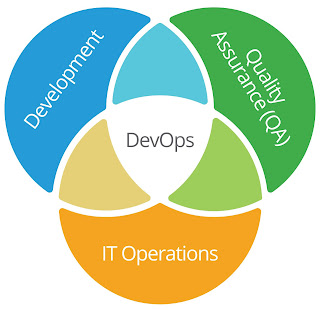Most popular DevOps tools
Advantages of DevOps:
Technically:
- Continuous software delivery
- Less complex problems to fix
- Faster resolution of problems
Business aspects:
- Faster delivery of features
- More stable operating environments
- More time available to add value (rather than fix/maintain)
Most popular DevOps tools:
- Git : Version Control System tool
- Jenkins : Continuous Integration tool
- Selenium : Continuous Testing tool
- Puppet, Chef, Ansible : Configuration Management and Deployment tools
- Nagios : Continuous Monitoring tool
- Docker : Containerization tool
- Jira - issue tracking
- Bitbucket - web-based version control repository
- SonarQube - continuous inspection of code quality to perform automatic reviews
- Artifactory/Nexus - binary repository manager
- Chef / Puppet /Ansible - application-deployment tool
- Jira - issue tracking
- Bitbucket - web-based version control repository
- SonarQube - continuous inspection of code quality to perform automatic reviews
- Artifactory/Nexus - binary repository manager
- Chef / Puppet /Ansible - application-deployment tool
How do all these tools work together
- Developers develop the code and this source code is managed by Version Control System tools like Git etc.
- Developers send this code to the Git repository and any changes made in the code is committed to this Repository.
- Jenkins pulls this code from the repository using the Git plugin and build it using tools like Ant or Maven.
- Configuration management tools like puppet deploys & provisions testing environment and then Jenkins releases this code on the test environment on which testing is done using tools like selenium.
- Once the code is tested, Jenkins send it for deployment on the production server (even production server is provisioned & maintained by tools like puppet).
- After deployment It is continuously monitored by tools like Nagios.
- Docker containers provides testing environment to test the build features.
- Developers develop the code and this source code is managed by Version Control System tools like Git etc.
- Developers send this code to the Git repository and any changes made in the code is committed to this Repository.
- Jenkins pulls this code from the repository using the Git plugin and build it using tools like Ant or Maven.
- Configuration management tools like puppet deploys & provisions testing environment and then Jenkins releases this code on the test environment on which testing is done using tools like selenium.
- Once the code is tested, Jenkins send it for deployment on the production server (even production server is provisioned & maintained by tools like puppet).
- After deployment It is continuously monitored by tools like Nagios.
- Docker containers provides testing environment to test the build features.

DevOps services are getting popular among various enterprises. You can trust our DevOps services without any doubt as we are known for the best web development services also along with DevOps.
ReplyDelete